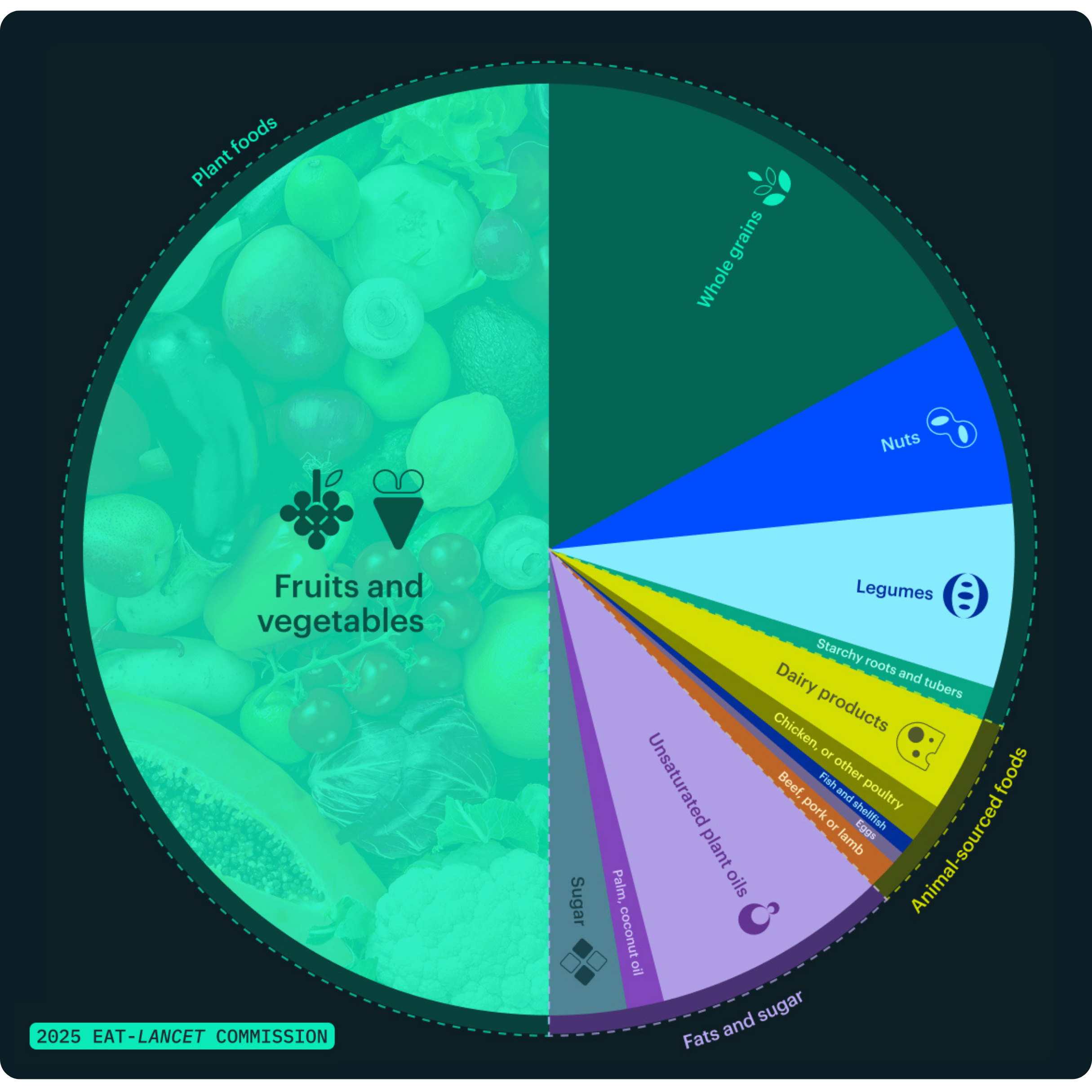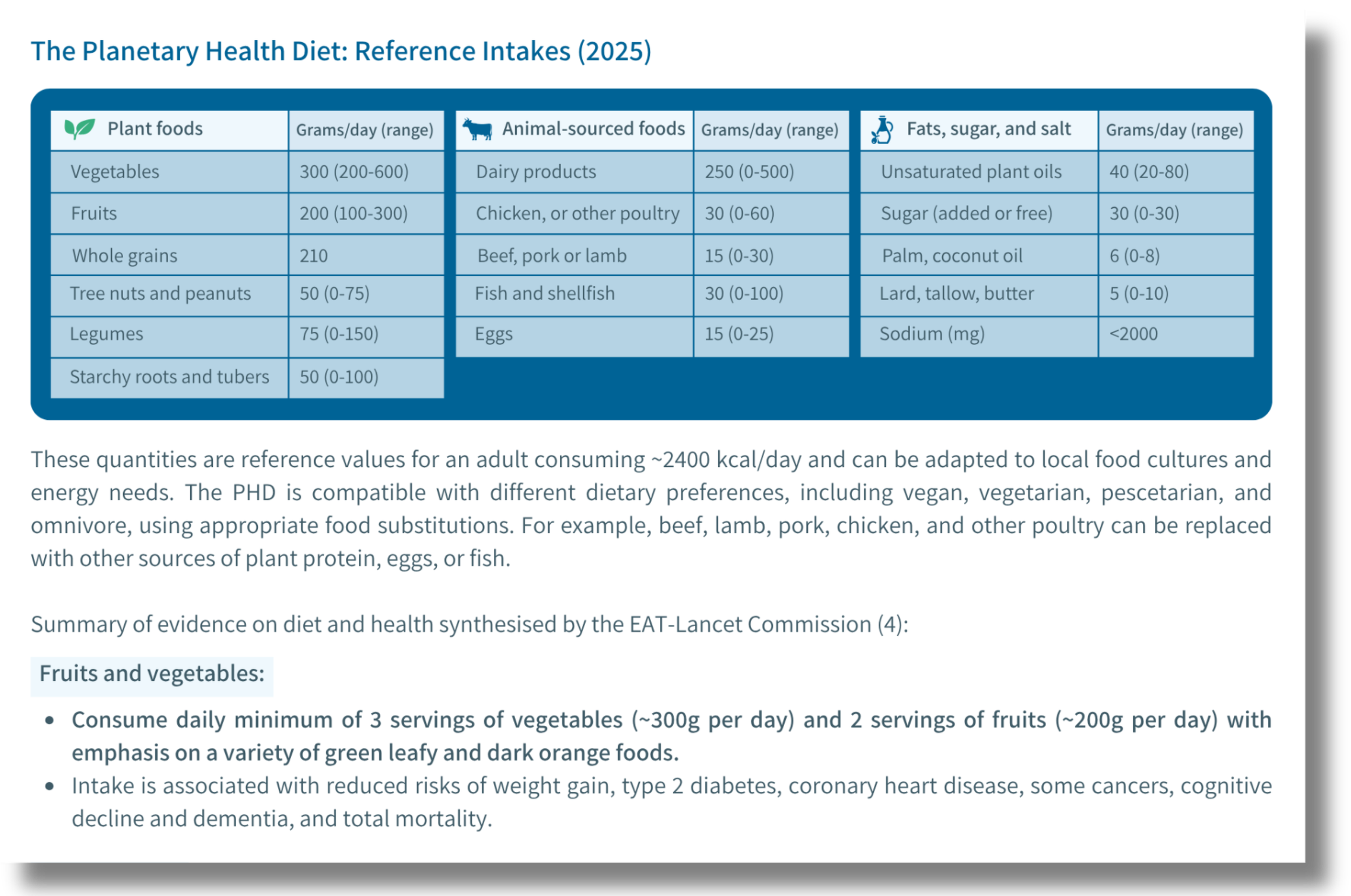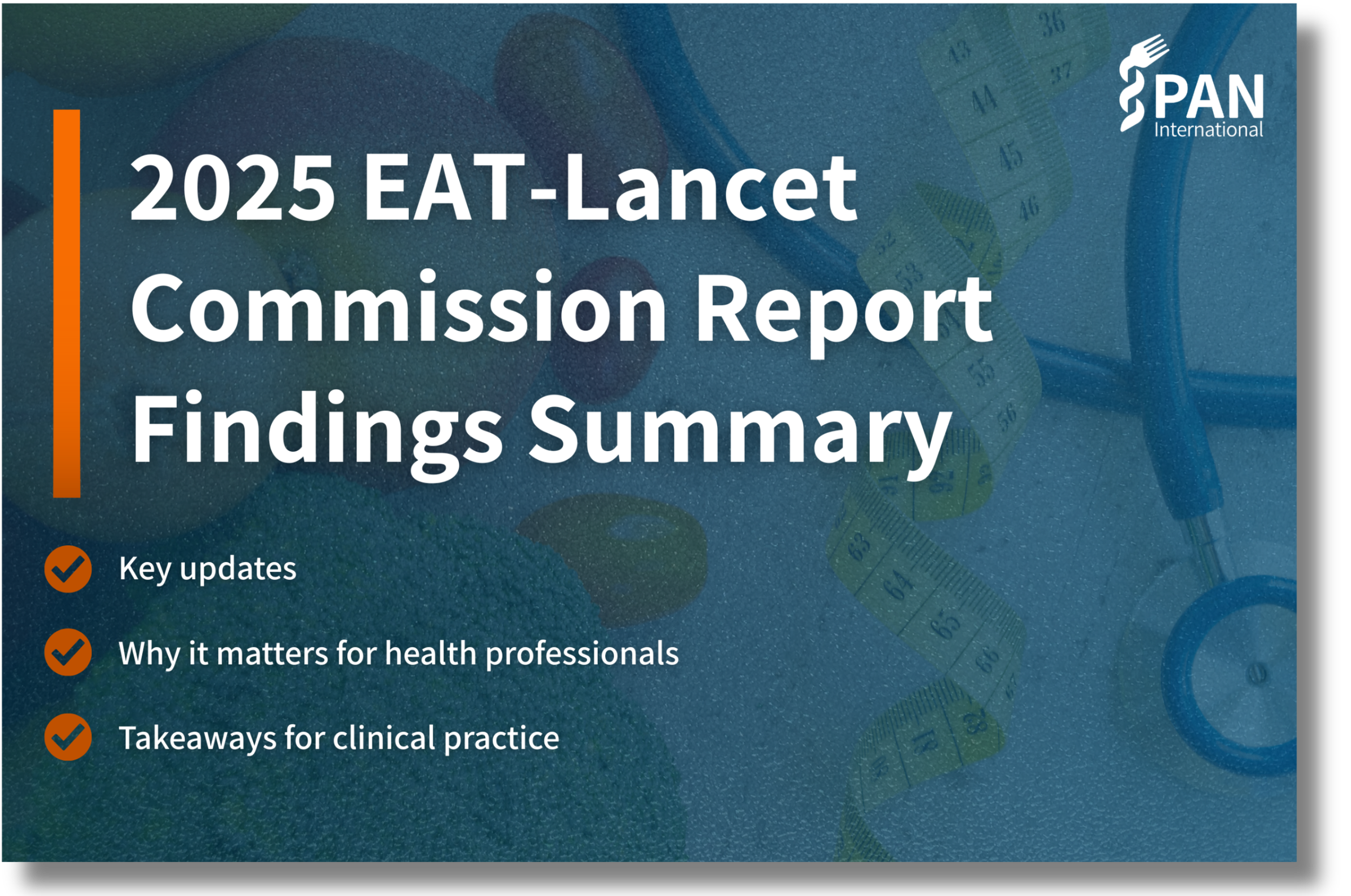
Lead the shift to healthier, more sustainable dietary patterns.
The Planetary Health Diet offers a practical, evidence-based blueprint for addressing some of the most urgent health and environmental challenges of our time. The health sector is uniquely positioned to implement this approach in clinical care, institutional contexts, and policy.
Action Brief for Healthcare Professionals
Developed through dialogues with over 70 global health organisations convened by PAN International and EAT, this Action Brief provides a roadmap for healthcare engagement and practical guidance to support collaboration across sectors, accelerating progress towards healthy, sustainable, and equitable food systems.
Planetary Health Diet
First published by the 2019 EAT-Lancet Commission, one of the most influential scientific reports with over 12,000 research papers and 600 policy citations, this global science-based dietary pattern is designed to support better health outcomes and reduce environmental impact.
-
Poor diets are a leading risk factor for premature death worldwide (Afshin et al., The Lancet, 2019), contributing to the global burden of noncommunicable diseases such as cardiovascular disease, type 2 diabetes, and certain cancers (WHO, 2023). Recent research suggests that shifting to healthier, more sustainable diets could prevent up to 15 million premature deaths each year (Gu et al., PNAS, 2024).
At the same time, food systems account for about one-third of global greenhouse gas emissions (IPCC, 2019). Aligning diets with planetary boundaries offers a unique opportunity to improve human health and reduce environmental harm
To address the links between diet, health, and environment, the EAT-Lancet Commission developed the Planetary Health Diet, a science-based framework that integrates human health and environmental sustainability.
-
The Planetary Health Diet (PHD) was first introduced in 2019 by the EAT-Lancet Commission, a group of 37 leading scientists from around the world. Their goal was to define an evidence-based dietary pattern that supports human health while remaining within environmental limits.
The original 2019 EAT-Lancet Report remains one of the world’s most cited scientific reports, with over 10,000 academic citations and more than 600 policy references.
The PHD emphasises fruits, vegetables, whole grains, legumes, nuts, and unsaturated plant oils, with modest amounts of dairy, fish, and poultry, and minimal red and processed meat, added sugars, and refined grains.
For healthcare professionals, the link is clear: poor diets are the leading driver of non-communicable diseases (NCDs), from type 2 diabetes to heart disease (Global Burden of Disease Study 2023, 2025). Most people worldwide consume too little fibre and too few whole plant-based foods (EAT-Lancet Report, 2025), while over-consuming harmful foods such as processed meat and sugary drinks high in saturated fat, salt, and sugar (EAT-Lancet Report, 2025). The Planetary Health Diet addresses these gaps, thus lowering the risk of chronic disease and providing a framework for prevention and treatment through nutrition.
-
Since 2019, more scientific evidence assessing the relationship between diet and health has emerged, and a large volume of studies have built on and critiqued the first PHD. The updated PHD integrates this new evidence, adapts to global feedback, and reflects today’s urgent realities.
It is a flexible diet allowing for regional adaptation, where healthy diets can be achieved across different populations while reducing food-related environmental pressures.
Implementing the Planetary Health Diet
As trusted voices, healthcare professionals are well-positioned to lead the shift towards healthier, more sustainable diets across clinical, public health, and policy settings.
As co-hosts of the Healthcare Professionals Community for Action, PAN International and EAT convened dialogues with 78 health professionals representing 72 organisations worldwide to translate the Planetary Health Diet into practical, sector-specific guidance. This process shaped the Action Brief, which outlines key priorities and actions to support transformation within healthcare and promote alignment across sectors.
Explore key actions, resources, and real-world examples to help bring nutrition to the forefront of healthcare.
-
As co-hosts of the Healthcare Professionals Community for Action with EAT, PAN International convened dialogues with over 70 health professionals from organisations across the world, culminating in the Action Brief for Healthcare Professionals. This resource captures the Healthcare Professionals Community for Action’s priorities, offering actions to accelerate transformation in healthcare and strengthen alignment across sectors.
This resource positions healthcare as a driver of change, offering clear, evidence-based guidelines for integrating nutrition into clinical practice, education, and policy. It serves as a practical pathway to achieve the health benefits of the Planetary Health Diet and could help prevent up to 15 million premature deaths each year. With poor diets responsible for an estimated 24% of all deaths globally (WHO, 2024), the brief underscores the essential role of healthcare in advancing healthier, more sustainable diets.
-
The Healthcare Professionals Action Brief is a practical framework outlining what the healthcare community must start, strengthen, and transform to accelerate the transition to healthy, sustainable, and equitable food systems.
It is organised into three parts:
1. Calls to Action:
What the healthcare community must start, strengthen, or transform to drive change within health systems, patient care, and community engagement.
Integrate nutrition into clinical practice and training, prioritise prevention, and mobilise healthcare professionals as advocates for sustainable diets.
2. Actions to Stop or Change:
Practices currently undertaken by the healthcare community that hinder progress toward healthier, more sustainable, and more just food systems.
Move beyond nutrient tunnel vision, phase out unhealthy hospital meals, and address both over and undernutrition together.
3. Unlocks:
Collaborative actions needed between healthcare and other communities to overcome systemic barriers (“lock-ins”) and create enabling environments for change.
Engage policymakers, hospitals, and educators to align systems, remove barriers, and scale up healthy, sustainable diets.
-
This Action Brief is a living tool, developed for and with healthcare professionals. It is intended to guide collaboration and drive action across the sector in alignment with the 2025 EAT-Lancet Commission.
Healthcare professionals are encouraged to adopt and adapt this brief within their own contexts, helping to scale its reach and amplify its impact.
Join the Healthcare Professionals Community for Action by writing to info@pan-int.org
Practical Resources
From Science to Action: Webinar Recording
Hosted by PAN International, this briefing session for the healthcare community featured Professor Walter Willett, MD, Co-Chair of the 2025 EAT-Lancet Commission, who discussed the latest evidence underlying the Planetary Health Diet and its implications for clinical practice and public health.
The recording is available exclusively to PAN International Premium Members on PANCO.
Physician Factsheet: The Planetary Health Diet
This factsheet equips physicians with the essentials of the Planetary Health Diet (PHD). It highlights diet recommendations, health and environmental benefits, nutrient considerations, and practical steps for applying principles of healthy and sustainable diets in patient care.
Access the factsheet for free on our global online community hub PANCO.
2025 EAT-Lancet Report Findings Summary
Explore our 2025 EAT-Lancet Report Findings Summary, created for physicians and health professionals. This resource distils key updates from the landmark report, highlighting their implications for health outcomes and practical applications in clinical settings.
Available exclusively to PAN International Premium Members on PANCO.
Our Stories of Progress
From hospital kitchens in Sweden to nutrition education in South Africa, PAN International, our regional offices, and our network are already putting the Planetary Health Diet into practice.
-
PAN’s Healthy Hospital Food Project works with partner clinics to redesign hospital menus and provide training for staff. By shifting towards more plant-rich meals and embedding sustainability into food services, hospitals model healthier diets for patients and staff alike.
As part of the project, PAN launched the Global Healthy Hospital Food Network, a collaborative initiative advancing evidence-based, sustainable nutrition in hospital catering worldwide in partnership with Greener by Default, Plant-Based Health Professionals UK, and ProVeg International.
-
Led by PAN International, the Dietary Guidelines Initiative (DGI) supports governments and institutions in aligning national dietary guidelines with public health and environmental objectives.
The DGI includes a growing global network of experts in over 25 countries and aims to transform 30 Food-Based Dietary Guidelines (FBDGs) and nutrition policies by 2030, providing adaptable frameworks to guide their development in ways tailored to each region’s needs, resources, and cultural traditions.
-
Our regional office in South Africa partners with universities and student groups to embed planetary health and nutrition into medical education.
Through initiatives like group cooking classes, medical and health science students learn to prepare indigenous, plant-based meals while exploring their health benefits.
-
PAN International collaborated with Hong Kong University School of Professional and Continuing Education (HKU Space) to launch The Science of Plant-Based Nutrition for Healthcare Professionals module.
This programme equips physicians, nurses, dietitians, and allied health professionals with cutting-edge knowledge to integrate plant-forward nutrition into clinical practice and promote sustainable health solutions.

Accelerate the shift to healthy, sustainable diets.
Join the Healthcare Professionals Community for Action: info@pan-int.org
-
Alliance of Bioversity and CIAT, American College of Lifestyle Medicine (ACLM), American Heart Association, Botswanan LifeStyle Medicine Society - Sarai Holistic Care, CESNI, Convene, Dalhousie University, Doctors for Nutrition, Dr Tan & Remanlay Institute, EAT, Eat Better by Design, Federal University of Goiás, Food and Nutrition Research Institute (FNRI), Food and Planet, Fresh Medicine, Global Alliance for Improved Nutrition (GAIN) & I-CAN, Greener Food, Hong Kong University, Howden, IMU University, INRAE, Indonesian Medical Education and Research Institute (IMERI), Indonesian Society of Allergy and Immunology (ISAI), Institute for Global Health, University College London, Institute of Food Safety and Nutrition (IFSN), Institute of Future Food Systems, Institute of Nutrition (Mahidol University), MRC Epidemiology Unit (University of Cambridge), MyNutriWeb, NHS England, NOURISH, NNEdPro Global Institute for Food, Nutrition and Health, NutrishZen, ONAV, PAN Brazil, PAN International, PAN Israel, PAN Netherlands, PAN South Africa, Philippine Stakeholders for Nutrition and Dietetics (PSND) Inc., Philippines Regulations Commission, Market-Driven Enhancement of Vegetable Food Value Chain in the Philippines (MV2C), Department of Agriculture & the Japan International Cooperation Agency (JICA), Physicians for the Future (Läkare för Framtiden), Plant-Based Data, Plant-Based Canada, Plant-based Health Professionals UK, Poltekkes Kemenkes Semarang, ProVeg International, ProVeg Portugal, Sociedad Chilena de Medicina y Nutrición Preventiva (SOCHIMENUP), South African Lifestyle Medicine Association, St John’s Innovation Centre, Swedish Association of Clinical Dietitians, Good Food Institute Europe, Green Dietitian, London School of Hygiene and Tropical Medicine, Toronto Metropolitan University, Universitas Sumatera Utara, Universiti Putra Malaysia, Universiti Teknologi MARA, University of Louvain, University College Léonard de Vinci, University of Ahmad Dahlan, University Of Mississippi Medical Center, University of Ghana, University of Indonesia Human Nutrition Research Center, University of Malta, University of Sao Paulo, World Health Organisation
References
Afshin A, et al. (2019). Health effects of dietary risks in 195 countries, 1990–2017: a systematic analysis for the Global Burden of Disease Study 2017. The Lancet. https://doi.org/10.1016/S0140-6736(19)30041-8
Gu X, Bui LP, Wang F, Wang DD, Springmann M, Willett WC. (2024). Global health and environmental impacts of dietary changes: An update to the EAT-Lancet Commission estimates. Proceedings of the National Academy of Sciences (PNAS), 121(5): e2319008121. https://doi.org/10.1073/pnas.2319008121
Hay SI, et al. (2025). Burden of 375 diseases and injuries, risk-attributable burden of 88 risk factors, and healthy life expectancy in 204 countries and territories, including 660 subnational locations, 1990–2023: a systematic analysis for the Global Burden of Disease Study 2023. The Lancet. https://doi.org/10.1016/S0140-6736(25)01917-8
IPCC. (2019). Climate Change and Land: An IPCC Special Report on Climate Change, Desertification, Land Degradation, Sustainable Land Management, Food Security, and Greenhouse Gas Fluxes in Terrestrial Ecosystems. Intergovernmental Panel on Climate Change. https://www.ipcc.ch/srccl/
Rockström J, et al. (2025). The EAT–Lancet Commission on healthy, sustainable, and just food systems. The Lancet. https://doi.org/10.1016/S0140-6736(25)01201-2
World Health Organization (WHO). (2023). Cardiovascular diseases (CVDs). Fact sheet. Geneva: World Health Organization. Available at: https://www.who.int/news-room/fact-sheets/detail/cardiovascular-diseases-(cvds)
World Health Organization (WHO). (2023). Noncommunicable diseases. Fact sheet. Geneva: World Health Organization. Available at: https://www.who.int/news-room/fact-sheets/detail/noncommunicable-diseases
World Health Organization (WHO). (2024). Preventing diet-related noncommunicable diseases: Guideline for primary and secondary prevention. Geneva: World Health Organization. Available at: https://www.who.int/publications/i/item/9789240115859
















